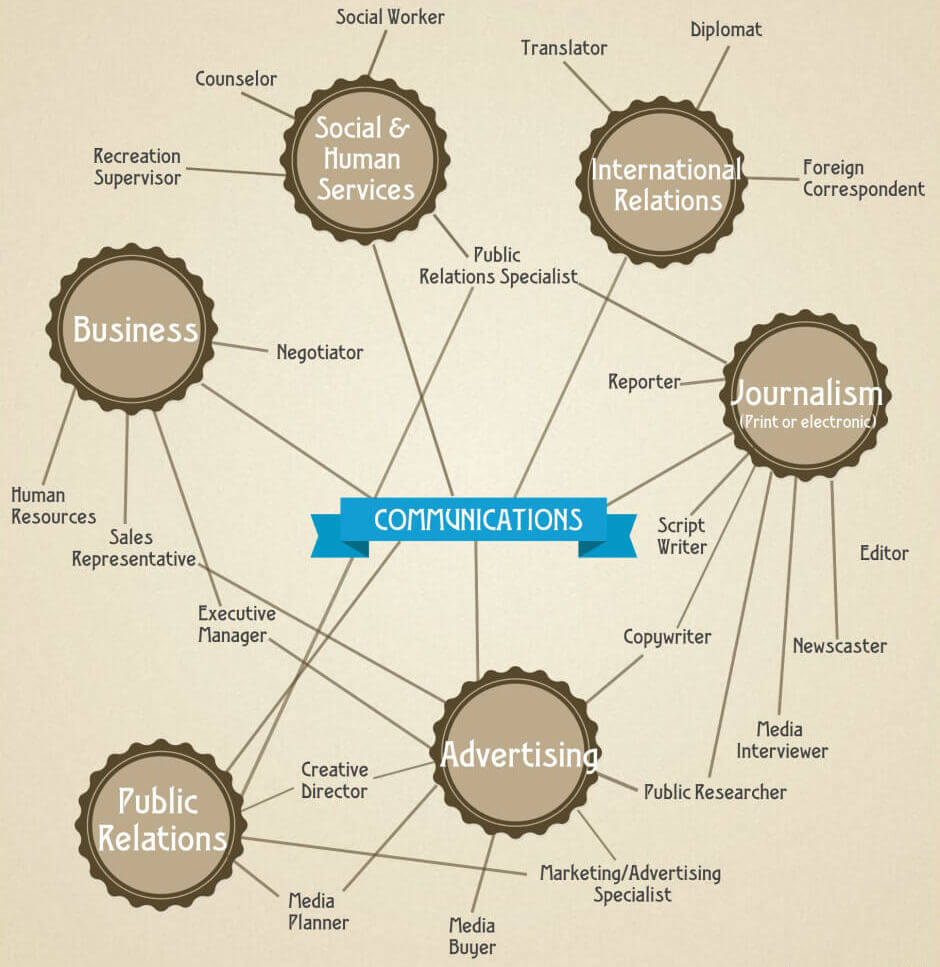Whether you are a confused/clueless (aka undeclared) freshman/sophomore in college, a declared communications major, or a college grad with a communications degree, you’ve probably asked yourself or had at least one person ask you this question:
“… WHAT EXACTLY IS COMMUNICATIONS (MAJOR)?”
And you probably hated yourself for saying,
Trust me, you’re not alone.
The question is a tough one to answer — it’s like asking a teenager who’s going through an identity crisis what they want to be when they grow up, or a jobless senior in college what they plan to do after they graduate.
But what’s even more annoying are these seemingly belittling questions and/or comments:
“So … you learned how to talk in college?”
Yeah … and we learned to listen as well.
“You must have it so easy!”
That’s why I only have 3 papers and 200 pages of reading due tomorrow.
“What can you even do with a communications degree”?
Oh, you know, just about anything.
But seriously.
What IS communications (as an academic discipline) and what CAN you do with a communications degree?
Well, that’s exactly what we’re going to answer right here and now, so that we can properly explain and defend ourselves (and our major) instead of face-palming whenever we’re asked this question.
A. Definition
Wikipedia:
Communication studies is an academic discipline that deals with processes of human communication. The discipline encompasses a range of topics, from face-to-face conversation to mass media outlets such as television broadcasting. Communication studies also examines how messages are interpreted through the political, cultural, economic, semiotic, hermeneutic, and social dimensions of their contexts.
World Wide Learn:
In the modern business world, a major in communications teaches you to combine a convincing argument with the appropriate medium to effectively deliver your message. It’s the modern marriage of theory and application.
B. “How do I know if communications is the right major for me?”
See if your answers to the below questions are yes, yes, and yes (and if yes, then you might want to seriously consider communications as your major)!
- You have an innate desire to understand and synthesize what you hear into a message you or someone else can use.
- You have strong verbal and writing skills.
- You display a caring, helpful attitude; a desire to teach or inform; and a never-ending curiosity about what’s going on around you.
C. What are some career options for communication majors?
*This is by no means an exhaustive list (the possibility is endless, especially with the continued birth of new jobs, thanks to technology!)*
Different concentrations
- Advertising
- Communication and Media Studies
- Communication Tech
- Digital and Print Journalism
- Broadcast Journalism
- Journalism
- Photojournalism
- Digital and Print Publishing
- Digital Imaging Design
- Publishing
- Graphic Communications
- Animation,Video Graphics and Special Effects
- Mass Communication and Media
- Mass Communication
- Public Relations
- Radio and Television Broadcasting
- Recording Arts
- Organizational Communication
- Speech Communication and Rhetoric
+ so much more!
Specific job titles
+ some more ⤵⤵⤵
Communication Education
- Language Arts Coordinator
- High School Speech Forensics/Debate Coach
- Drama Director
- Speech Communication Department Chairperson
- School Counselor
- Education Researcher
- Audiovisual Specialist
- Educational Administrator
Electronic Media/Radio/Television/Broadcasting
- Broadcasting Station Manager
- Director of Broadcasting
- Film/Tape Librarian
- Community Relation Director
- News Writer
- Engineer
- Technical Director
- Advertising Sales Coordinator
- Market Researcher
- Actor/Actress
- Announcer
- News and Relation Manager
- Comedy Writer
- Casting Director
- Producer
- Business Manager
- Floor Manager
- Talk Show Host
Government/Politics
- Public Information Officer
- Legislative Assistant
- Campaign Director
- Research Specialist
- Program Coordinator
- Elected Official
High Technology Industries
- Television Producer/Director
- Systems Analyst
- Technical Copywriter
- Language Specialist
- Cognition Researcher
- Audio & Visual Computer Display Specialist
Communication and Health Care
- Health Educator
- School Health Care Administrator
- Hospital Director of Communication
- Health Communication Analyst
- Research Analyst
- Medical Training Supervisor
- Health Personnel Educator
- Hospice Manager
- Heath Care Counselor
Law
- Public Defender
- Corporate Lawyer
- District Attorney
- Private Practice Lawyer
- Legal Researcher Mediation & Negotiation Specialist
- Legal Secretary
- Legal Reporter
- Legal Educator
Theater/Performing Arts
-
- Performing Artist
- Script Writer
- Arts Administrator
- Performing Arts Educator
- Costume Designer
- Scenic Designer
- Lighting Theatre Critic
- Makeup Artist
- Stage Manager
- Model
- Casting Director
[divider]
If it’s still too early for you to be thinking about jobs/careers, don’t worry.
Here are some internship roles you can take on while you’re still in college:
Marketing/PR/Social Media Intern
As a marketing intern, you will be assisting the company/organization in the development and implementation of its marketing, business development, and public relations plans. You may assist in coordinating various marketing materials and methods including (e)mail, print ads, and social media. You may also assist with CRM (Customer Relationship Management), and take part in the content creation and campaigns. Simply put, you are helping brands connect with their audience.
What companies are looking for in a marketing intern
- Excellent organizational skills
- A keen eye for details
- The ability to prioritize and multitask
- Strong verbal and written communication skills
- Excellent interpersonal skills and follow- up skills
- Leadership ability & potential (proactive problem solver!)
- The ability to work independently as well as in teams
Editorial/Copywriting Intern
As an editorial intern, you will do one or more of the following: writing (creating content), fact checking, proofreading, copy editing, preparing publicity materials and more. Your writing may be to inform, sell, or simply attract. But, whatever the purpose, your writing will be representing the brand so it’s important to learn, adapt, and speak in its unique voice. For this position/role, a knowledge of SEO and blog writing will be a huge plus — so get on those real world résumé boosters! An obvious benefit (for YOU, the intern) is that you get to build your portfolio of published writing!
What companies are looking for in an editorial intern
- Excellent writing, proofreading, and communication skills
- A keen eye for details and trends
- Strong research skills
- Interest in current events or expertise knowledge on a certain subject
- Ability to meet deadlines
Conclusion
For those seeking a liberal arts education, communications is a great major choice. You can explore the different concentrations and narrow down your career path as you discover your passions and talents throughout your college years and beyond.









